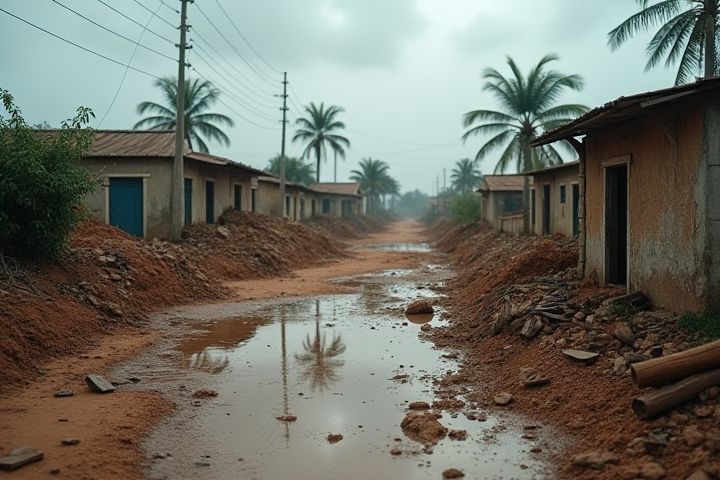
Nigeria faces a range of natural disasters, primarily including floods, droughts, and desertification. The country experiences heavy rainfall, especially during the rainy season, leading to devastating floods that can displace thousands and damage infrastructure. In northern regions, prolonged droughts have resulted in significant water shortages, impacting agriculture and food security. Desertification threatens arable land, exacerbating poverty and forcing communities to migrate in search of livelihoods. Understanding these challenges is crucial for implementing effective disaster management strategies to mitigate their impacts on vulnerable populations.
Flooding impact
Flooding in Nigeria poses significant threats to both urban and rural communities, leading to the displacement of thousands and damaging critical infrastructure. Heavy rainfall patterns, often exacerbated by climate change, contribute to severe flood events, particularly in the Niger and Benue river basins. Agricultural productivity suffers as flooded farmland results in crop loss and food insecurity, while waterborne diseases increase due to contaminated waterways. Effective flood management strategies, including improved drainage systems and early warning systems, are essential to mitigate these impacts and protect livelihoods.
Drought occurrences
Nigeria frequently faces severe drought occurrences, particularly in the northern regions where arid conditions prevail. These prolonged dry spells lead to water scarcity, negatively impacting agriculture, livestock, and the overall economy. The devastating consequences include reduced crop yields, food insecurity, and increased migration as communities search for viable living conditions. Mitigation strategies, such as sustainable water management and drought-resistant crop varieties, are essential to bolster resilience against these natural disasters.
Soil erosion issues
Soil erosion in Nigeria is a significant environmental concern, exacerbated by heavy rainfall, deforestation, and poor land management practices. The phenomenon leads to the loss of fertile topsoil, severely affecting agricultural productivity and contributing to food insecurity. Coastal regions, particularly in the Niger Delta, are highly vulnerable to erosion, leading to displacement of communities and loss of infrastructure. Effective interventions, such as reforestation and sustainable farming methods, are essential to mitigate the impacts of soil erosion and preserve the country's natural resources.
Desertification trends
Desertification trends in Nigeria have intensified due to climate change, deforestation, and unsustainable agricultural practices. The northern regions, particularly in the Sahel zone, experience severe land degradation, leading to a loss of arable land and water scarcity. This environmental crisis not only threatens biodiversity but also exacerbates food insecurity and displacement among local populations, ultimately impacting your livelihoods. Efforts to combat desertification, such as afforestation and community-based resource management, are crucial for restoring ecological balance and enhancing resilience against future natural disasters.
Climate change effects
Nigeria faces increasing natural disasters attributed to climate change, including flooding, droughts, and desertification. The Niger River basin is particularly vulnerable, experiencing severe flooding during heavy rainfall seasons, which disrupts agriculture and displaces communities. Rising temperatures contribute to the frequency and intensity of droughts in the northern regions, impacting food security and water availability. Implementing sustainable practices and enhancing disaster preparedness is crucial for mitigating these adverse effects and protecting vulnerable populations in Nigeria.
Infrastructure vulnerability
Nigeria frequently faces natural disasters, such as floods, droughts, and desertification, significantly impacting its infrastructure. The country's roads, bridges, and buildings often succumb to the extreme weather conditions, revealing a critical vulnerability in urban planning and construction standards. Flooding in regions like Lagos disrupts transportation and damages vital services, while desertification in the northern areas threatens agricultural sustainability. By investing in resilient infrastructure and disaster management strategies, you can help mitigate these risks and safeguard communities against future calamities.
Emergency response systems
Nigeria faces a variety of natural disasters, including floods, droughts, and erosion, significantly impacting its communities and infrastructure. Emergency response systems in Nigeria involve collaboration between the National Emergency Management Agency (NEMA) and state-level agencies to efficiently coordinate disaster relief efforts. These systems emphasize real-time data collection and communication to provide timely assistance and minimize loss of life and property. Implementing community-based preparedness programs enhances resilience, enabling you to better understand local risks and engage in proactive measures.
Public awareness campaigns
Public awareness campaigns in Nigeria play a crucial role in mitigating the impacts of natural disasters, such as floods, droughts, and desertification. These initiatives aim to educate communities about risk assessment, emergency preparedness, and response strategies, enabling citizens to safeguard their lives and property. Collaboration between government agencies, NGOs, and local organizations ensures that information about potential threats and preventive measures reaches vulnerable populations effectively. Through workshops, radio broadcasts, and social media outreach, you can stay informed and actively participate in building a resilient community against natural disasters.
Economic implications
Natural disasters in Nigeria significantly impact the economy, disrupting agricultural production, which is a vital sector for food security and employment. Flooding in regions such as Benue and Niger can devastate crops, leading to increased food prices and loss of income for farmers. Additionally, urban areas face challenges from erosion and infrastructural damage, escalating repair costs and straining local government budgets. You may find that these economic ramifications hinder overall growth, create reliance on humanitarian aid, and increase poverty levels across affected communities.
Government policies
Nigeria faces significant challenges from natural disasters, including floods, droughts, and desertification, which are exacerbated by climate change. The Nigerian government implements policies aimed at disaster risk reduction, including the National Policy on Disaster Management, which emphasizes preparedness, response, and recovery strategies. Local communities are engaged via training programs and awareness campaigns to enhance resilience and better equip them to handle emergencies. Furthermore, partnerships with international organizations help to provide funding and technical support for infrastructure improvements and sustainable development initiatives.
